IN THIS ARTICLE
What you should look for in an anti-inflammatory diet.
Inflammation in the body can pose a serious threat to your health and is associated with a variety of chronic conditions. But did you know that one of the most effective ways to fight inflammation is not through medication, but through an anti-inflammatory diet? Yes, you have it in your hand! By making conscious choices in your diet, you can actively influence how your body responds to inflammatory processes and positively impact your health.
Learn which foods you should prefer and which you should avoid to benefit from the positive effects. Discover the do’s and don’ts for a healthy, anti-inflammatory diet that boosts your well-being.
What are inflammations actually?
Whenever your body detects something foreign – for example, an invading microbe, plant pollen, or chemical – your immune system is activated. This often triggers a process called inflammation. These bursts of inflammation, directed against truly threatening invaders, protect your health. So inflammation is a natural reaction that is basically positive. They play an important role in the defense against harmful substances and support the healing process.
In addition to acute inflammation, which is identifiable by obvious signs such as redness, swelling and pain, there is also the so-called silent inflammation, also known as chronic, low-grade or subclinical inflammation. These are inflammatory processes in the body that last for a long period of time and often show little or no typical symptoms. Unlike acute inflammation, which is recognizable by obvious signs such as redness, swelling and pain, silent inflammation often goes unnoticed.
This type of inflammation can be triggered by various factors, such as an unbalanced diet, lack of exercise, stress, smoking or obesity.
Although they do not cause obvious symptoms, silent inflammation can still have harmful effects on the body. They are associated with an increased risk of chronic disease because they can damage cells and tissues over time. Silent inflammation plays a role in the development of cardiovascular disease, diabetes, obesity, cancer and other health problems.
It is important to watch for silent inflammation and take preventive measures to prevent chronic disease. An anti-inflammatory diet can help reduce silent inflammation and promote health.
Foods that cause inflammation
Inflammatory foods play a significant role in silent inflammation by stimulating the body to maintain chronic inflammatory responses. Regular consumption of these foods increases the inflammatory process in the body and increases your risk of chronic diseases. Here are some pro-inflammatory foods you should specifically avoid:
- Refined carbohydrates: Foods that contain refined carbohydrates, such as white bread, white flour products, sweets and sugary drinks, can cause blood sugar levels to rise and promote inflammation.
- Industrial sugar: Sugar is known for its pro-inflammatory effect. Excessive consumption of sugary foods and beverages can promote silent inflammation in the body.
- Trans fats and saturated fats: Trans fats and saturated fats found in fried foods, processed snacks, and fatty meats are associated with an increased risk of inflammation.
- Processed foods: Fast food, convenience foods and industrially produced foods often contain a variety of pro-inflammatory ingredients such as artificial colors, preservatives and flavor enhancers.
- Omega-6 fatty acids: Although omega-6 fatty acids are important for the body in moderation, an excessive ratio of omega-6 to omega-3 fatty acids (as often found in a typical Western diet) can promote inflammation. Foods such as vegetable oils (sunflower oil, soybean oil, corn oil) contain abundant omega-6 fatty acids.
By reducing or avoiding these pro-inflammatory foods in your diet and replacing them with anti-inflammatory foods, you can help reduce silent inflammation in the body.
Anti-inflammatory diet
An anti-inflammatory diet avoids all pro-inflammatory foods and consists primarily of fresh, natural foods. These include antioxidants, omega-3 fatty acids, fiber, phytochemicals. Such foods can help neutralize harmful free radicals and reduce inflammatory processes.
- Colorful vegetables: broccoli, spinach, peppers, carrots, tomatoes, and many other colorful vegetables are rich in antioxidants and phytonutrients that have anti-inflammatory properties.
- Fresh fruit: berries, oranges, apples, avocado, and other fruits contain important nutrients and antioxidants that can reduce inflammation.
- Fatty fish: Salmon, mackerel, herring and sardines are rich in omega-3 fatty acids, which have powerful anti-inflammatory effects.
- Nuts and seeds: Walnuts, chia seeds, flax seeds and almonds are good sources of healthy fats and antioxidants.
- Healthy fats: extra virgin olive oil, coconut oil and avocado oil are anti-inflammatory fats that can be used in cooking.
- Spices: Turmeric (sh. also “What is turmeric actually good for?”), ginger, garlic and cinnamon are spices with strong anti-inflammatory properties
- Green tea: Green tea is rich in antioxidants that can reduce inflammation in the body.
- Whole grains: Whole grains such as oats, brown rice and quinoa are rich in fiber and anti-inflammatory nutrients.
- Probiotic foods: yogurt, kefir, sauerkraut and kimchi can support gut health and reduce inflammation in the body.
A balanced and varied diet rich in these anti-inflammatory nutrients can help reduce the risk of inflammation and increase overall well-being.
Your diet not only affects your health, but also that of your hair! Find out which nutrients your hair really needs to shine and grow healthily in our article “Boost your hair growth and quality”.
Boost anti-inflammatory nutrition with nutritional supplements
During times of inflammatory processes, your body consumes more antioxidants and nutrients to fight harmful free radicals and regulate inflammation. Vitamin C, vitamin E, zinc, selenium and turmeric play a crucial role and can be supported by targeted nutritional supplementation:
- Vitamin C: A powerful antioxidant that neutralizes free radicals and reduces inflammation.
- Vitamin E: Acts similar to vitamin C as an antioxidant and protects cells from oxidative stress.
- Zinc: Regulates the immune system and promotes anti-inflammatory cytokines.
- Selenium: Supports the function of endogenous antioxidants and inhibits inflammation.
- Turmeric (Curcumin): A powerful natural anti-inflammatory that blocks pro-inflammatory enzymes.
A balanced diet rich in anti-inflammatory nutrients can help reduce the risk of inflammation and increase overall well-being. Products such as the organic turmeric extract Tame The Flame from Ogaenics in combination with an organic multivitamin can be an optimal supplement to an anti-inflammatory diet.
For women over 55, Ogaenics’ organic multivitamin Mrs. Do it All 55+ even contains a powerful turmeric extract so you only need one product per day.
This way, you can ensure that your body always receives all the anti-inflammatory nutrients in sufficient quantities to effectively fight inflammation and live a healthy, inflammation-free life.
Perfect supporters for your anti-inflammatory diet
-
Bestseller
Mrs Do-It-All 18+
Organic Multivitamin Complex Premium for women of fertile age, All-In-One!67,92 €79,90 €2.302,59 €1.957,35 € / kg -
Bestseller
Mrs Do-It-All 45+
Organic Multivitamin Complex Premium for menopausal women, All-In-One!67,92 €79,90 €1.997,50 €1.698,00 € / kg -
Bestseller
Mrs Do-It-All 55+
Organic Multivitamin Complex Premium for women after the menopause, All-In-One!67,92 €79,90 €1.997,50 €1.698,00 € / kg -
Tame The Flame
Organic Turmeric Complex Premium high dose of organic turmeric extract and powder, one capsule/day!46,67 €54,90 €1.256,29 €1.067,96 € / kg
Conclusion
An anti-inflammatory diet can help control inflammation in the body and reduce the risk of chronic disease. By making conscious food choices, you can make your lifestyle anti-inflammatory and sustain your health. Targeted supplementation with turmeric/curcumin and an organic multivitamin that contains all the essential nutrients can support you in your anti-inflammatory diet.
If you want to learn more about the effects of nutrition on rheumatism and joint pain, we have another interesting article for you here: “No more desire for rheumatism and joint pain?”.
An inflammation-free metabolism only works if the thyroid gland is optimally supplied. Find out here, why iodine is essential for your metabolism and how to integrate it into your diet.


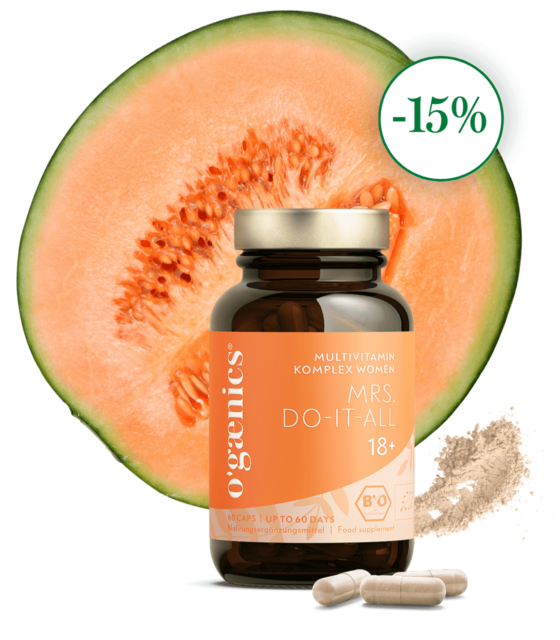
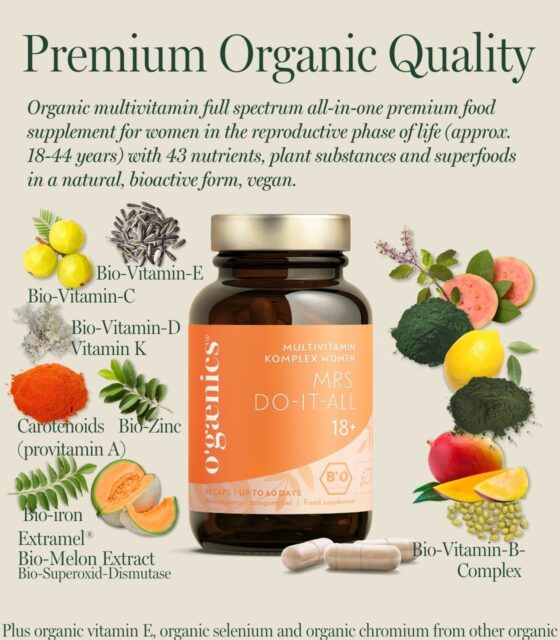
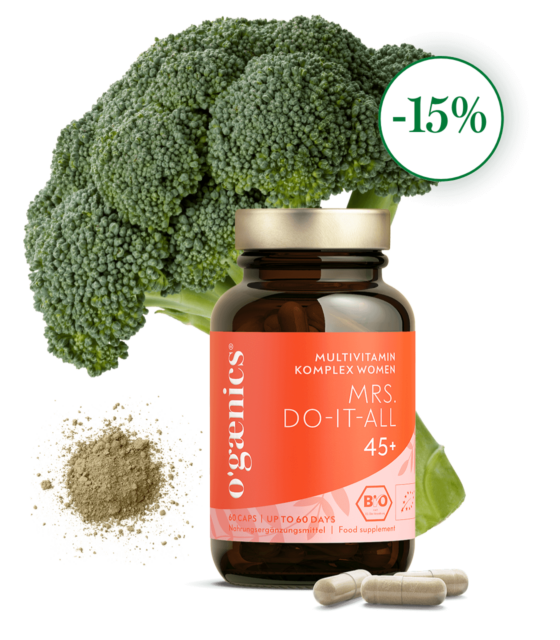
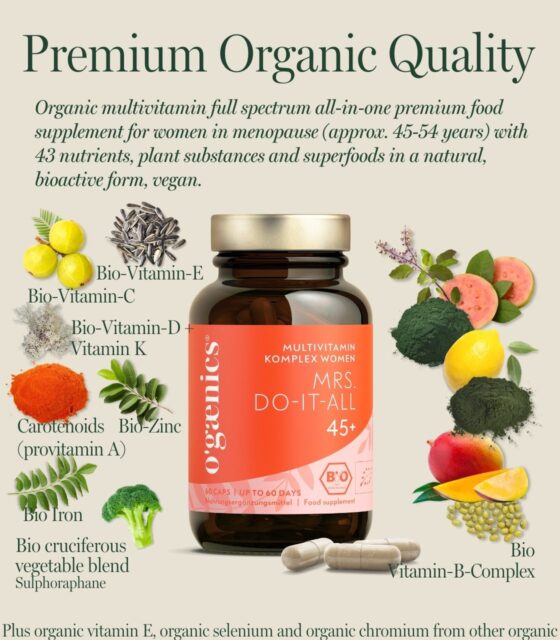
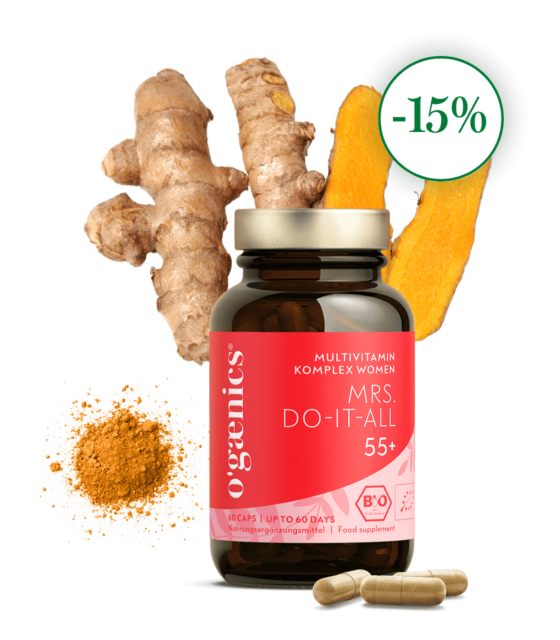
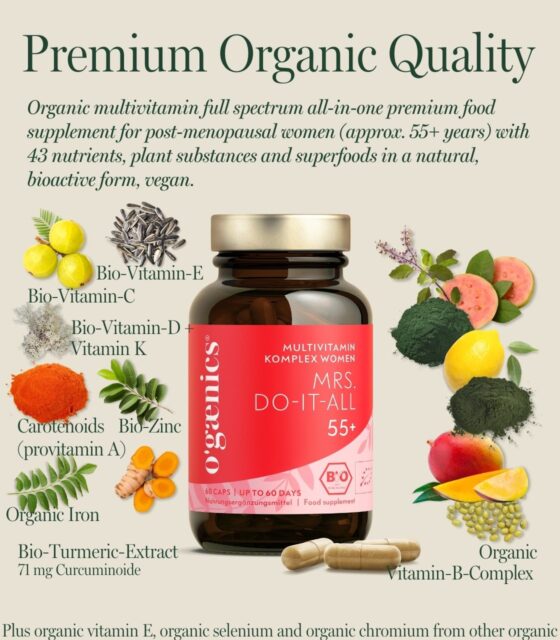
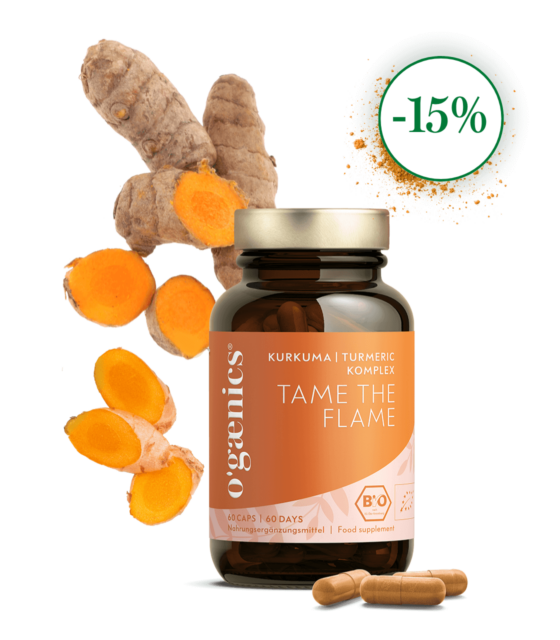
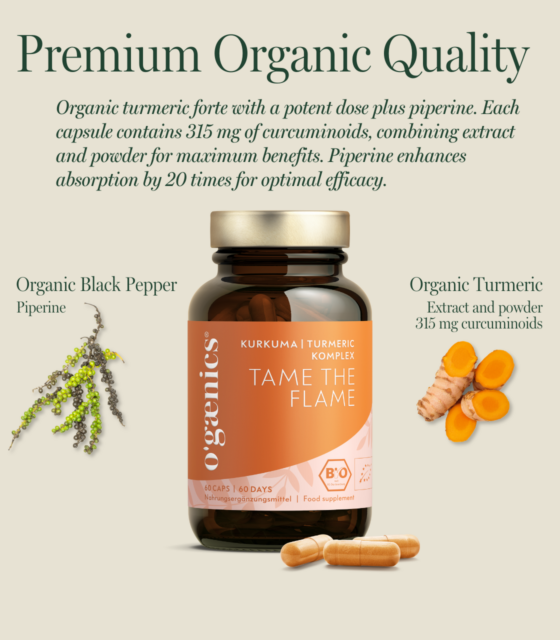
 No products in the cart.
No products in the cart.